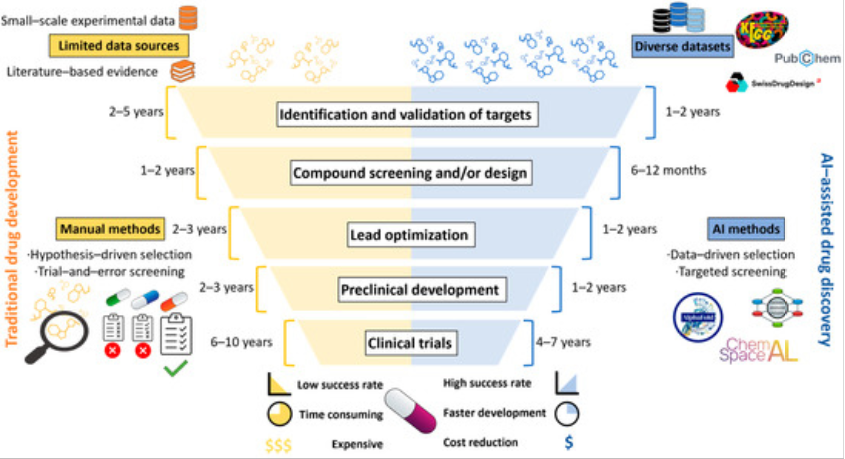Antimicrobial resistance (AMR) is a global health emergency that already causes over 1.2 million deaths every year. But here’s the good news: AI-driven drug discovery is no longer a promise, it’s happening right now. For example, in 2023, Insilico Medicine brought the first AI-discovered drug (INS018_055, for idiopathic pulmonary fibrosis) into Phase II clinical trials, proof that AI can compress years of research into months. In the antimicrobial field, companies like Phare Bio and initiatives such as Ardigen’s antimicrobial peptide platform are using AI to identify new molecules that could replace or enhance antibiotics.
🏆🧬 AlphaFold, David Baker, and the Acceleration of Drug Design In 2023, David Baker received the Nobel Prize for his groundbreaking advances in computational protein design, a field transformed by DeepMind’s AlphaFold. With its near-perfect structural predictions, AlphaFold has changed how we approach biology: what once took years in the lab now takes hours on a computer. For AMR, this is revolutionary, scientists can design novel antimicrobial peptides and protein-based drugs that are more effective, stable, and less toxic, opening a new era of antibiotic innovation.
💥 AI and Antimicrobial Antibodies: Promise and Debate AI platforms are being tested to design antibodies against resistant bacteria. For instance, Absci is leveraging generative AI to create novel antibodies with improved binding against pathogens. While promising, these black-box models raise concerns: unforeseen risks can be hidden in their complexity. That’s why transparency, validation, and ethics must guide AI in drug development.
🌍 Ethics, Collaboration, and Open Data: Pillars to Accelerate Innovation Fighting AMR requires more than algorithms, it demands global collaboration. Platforms such as ELIXIR (European Life-science Infrastructure for Biological Information), Open Targets (a partnership between EMBL-EBI, GSK, Sanofi, and others), and NCBI’s GenBank make structural, genomic, and clinical data openly available, empowering scientists worldwide to validate models and speed discoveries. These shared resources are critical to ensure AI innovation remains safe, equitable, and globally accessible.
And as the debate grows, researchers continue to call for responsible AI in life sciences, advocating transparency, inclusivity, and regulation to ensure that technology truly serves public health.
This blog was written by Ismael Castañón, one of the PhD candidates working in the SSBB consortium. Ismael is pursuing his PhD trajectory at the University of Stavanger, SetLance and Hylomorph.


